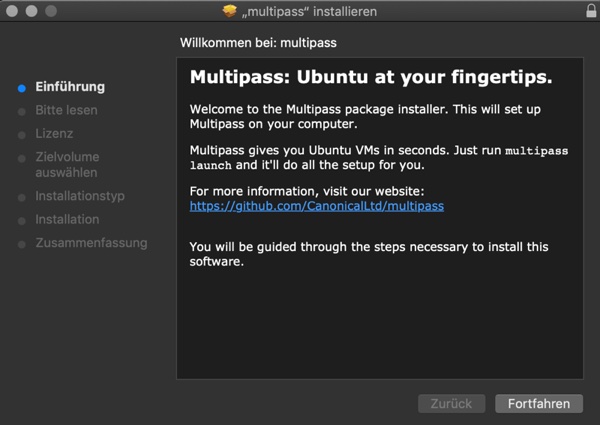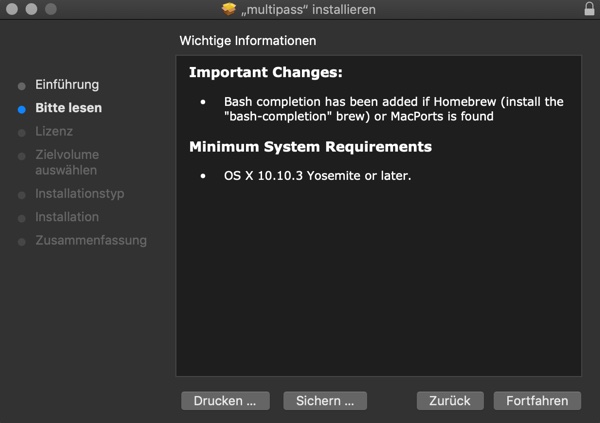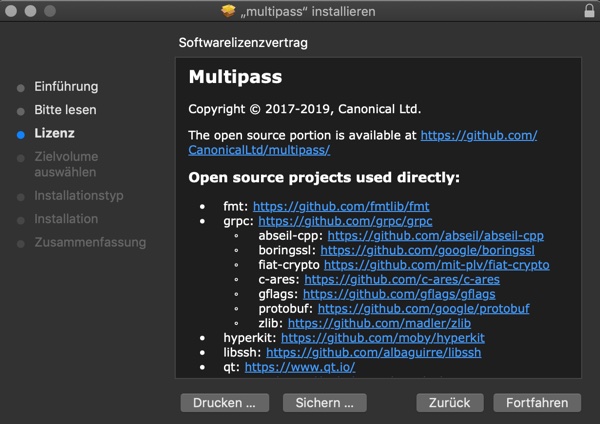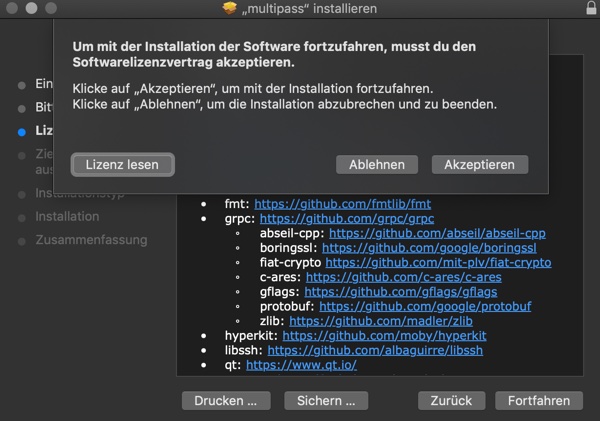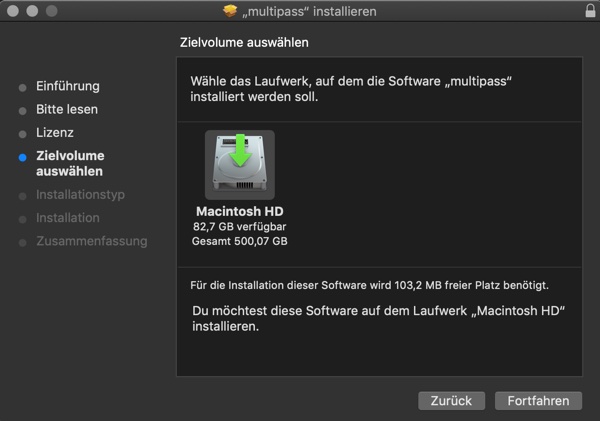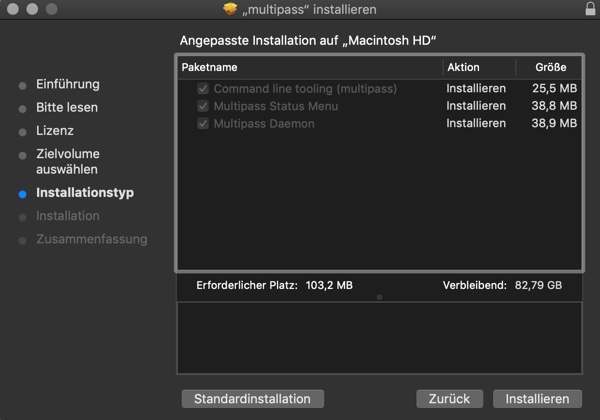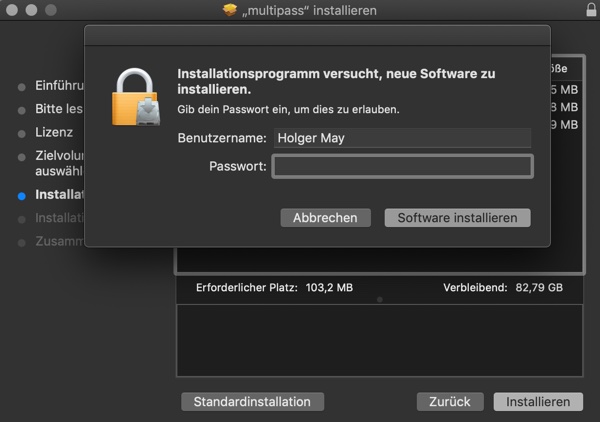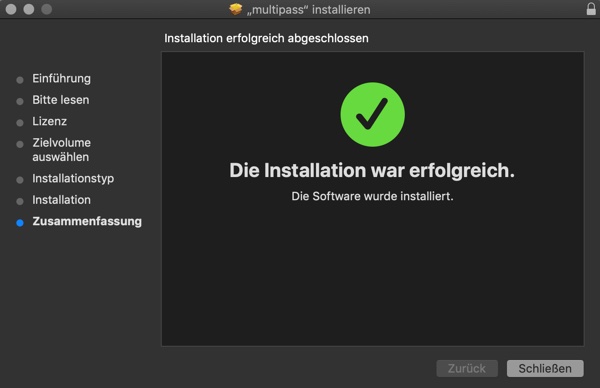Canonical multipass
Ubuntu-VMs (Mini-Cloud)
Multipass ist ein VM-Manager (Ubuntu-Image) mit minimalem Overhead und Cloud-Init unterstützt für Linux (KVM), macOS (HyperKit) und Windows (Hyper-V).

Installationsprogramm - GitHub-Release-Seite
Systemvoraussetzungen: Mac 2010 oder neuer (Intel® EPT) und OS X 10.10.3 oder neuer
macOS Terminal oder iTerm2
Mac:~ holger$ multipass
Usage: multipass [options] <command>
Create, control and connect to Ubuntu instances.
This is a command line utility for multipass, a
service that manages Ubuntu instances.
Options:
-h, --help Display this help
-v, --verbose Increase logging verbosity, repeat up to three times for more
detail
Available commands:
delete Delete instances
exec Run a command on an instance
find Display available images to create instances from
get Get a configuration option
help Display help about a command
info Display information about instances
launch Create and start an Ubuntu instance
list List all available instances
mount Mount a local directory in the instance
purge Purge all deleted instances permanently
recover Recover deleted instances
restart Restart instances
set Set a configuration option
shell Open a shell on a running instance
start Start instances
stop Stop running instances
suspend Suspend running instances
transfer Transfer files between the host and instances
umount Unmount a directory from an instance
version Show version details
Mac:~ holger$
Mac:~ holger$ multipass version
multipass 0.8.0+mac
multipassd 0.8.0+mac
Mac:~ holger$
Mac:~ holger$ multipass find
Image Aliases Version Description
snapcraft:core core16 20191113 Snapcraft builder for Core 16
snapcraft:core18 20191113 Snapcraft builder for Core 18
16.04 xenial 20191204 Ubuntu 16.04 LTS
18.04 bionic,lts 20191205 Ubuntu 18.04 LTS
Mac:~ holger$
Mac:~ holger$ multipass launch --name u18
Mac:~ holger$
Mac:~ holger$ multipass list
Name State IPv4 Image
u18 Running 192.168.64.13 Ubuntu 18.04 LTS
Mac:~ holger$
Mac:~ holger$ multipass launch 16.04 --name u16
Mac:~ holger$
Mac:~ holger$ multipass list
Name State IPv4 Image
u16 Running 192.168.64.14 Ubuntu 16.04 LTS
u18 Running 192.168.64.13 Ubuntu 18.04 LTS
Mac:~ holger$ multipass exec u16 -- lsb_release -a
No LSB modules are available.
Distributor ID: Ubuntu
Description: Ubuntu 16.04.6 LTS
Release: 16.04
Codename: xenial
Mac:~ holger$
Mac:~ holger$ multipass shell u16
Welcome to Ubuntu 16.04.6 LTS (GNU/Linux 4.4.0-170-generic x86_64)
* Documentation: https://help.ubuntu.com
* Management: https://landscape.canonical.com
* Support: https://ubuntu.com/advantage
0 packages can be updated.
0 updates are security updates.
New release '18.04.3 LTS' available.
Run 'do-release-upgrade' to upgrade to it.
Last login: Fri Dec 6 13:25:13 2019 from 192.168.64.1
multipass@u16:~$
multipass@u16:~$ uname -a
Linux u16 4.4.0-170-generic #199-Ubuntu SMP Thu Nov 14 01:45:04 UTC 2019 x86_64 x86_64 x86_64 GNU/Linux
multipass@u16:~$
multipass@u16:~$ sudo -s
root@u16:~#
root@u16:~# halt
Mac:~ holger$
Mac:~ holger$ multipass list
Name State IPv4 Image
u16 Stopped -- Ubuntu 16.04 LTS
u18 Running 192.168.64.13 Ubuntu 18.04 LTS
Mac:~ holger$
Mac:~ holger$ multipass shell u16
Starting u16
multipass@u16:~$
Mac:~ holger$ multipass stop u16
Mac:~ holger$
Mac:~ holger$ multipass start u16
Mac:~ holger$ multipass mount multipass u16:/media/multipass
Mac:~ holger$ multipass umount u16
Multipass vom Mac entfernen:
Mac:~ holger$ sudo sh "/Library/Application Support/com.canonical.multipass/uninstall.sh"

